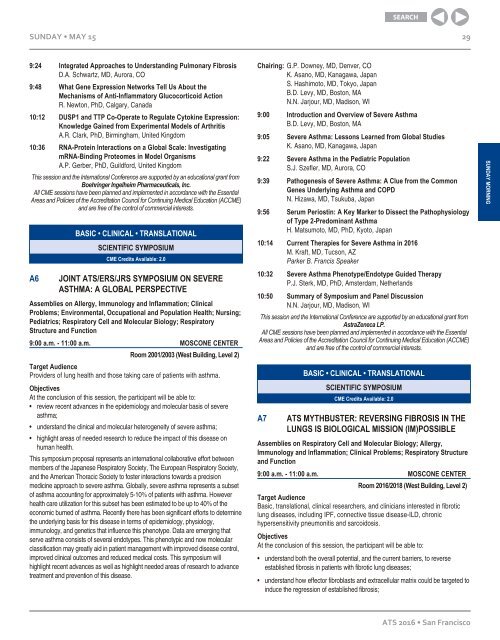Final Program
h6okmgq
h6okmgq
You also want an ePaper? Increase the reach of your titles
YUMPU automatically turns print PDFs into web optimized ePapers that Google loves.
SUNDAY • MAY 15 29<br />
9:24 Integrated Approaches to Understanding Pulmonary Fibrosis<br />
D.A. Schwartz, MD, Aurora, CO<br />
9:48 What Gene Expression Networks Tell Us About the<br />
Mechanisms of Anti-Inflammatory Glucocorticoid Action<br />
R. Newton, PhD, Calgary, Canada<br />
10:12 DUSP1 and TTP Co-Operate to Regulate Cytokine Expression:<br />
Knowledge Gained from Experimental Models of Arthritis<br />
A.R. Clark, PhD, Birmingham, United Kingdom<br />
10:36 RNA-Protein Interactions on a Global Scale: Investigating<br />
mRNA-Binding Proteomes in Model Organisms<br />
A.P. Gerber, PhD, Guildford, United Kingdom<br />
This session and the International Conference are supported by an educational grant from<br />
Boehringer Ingelheim Pharmaceuticals, Inc.<br />
All CME sessions have been planned and implemented in accordance with the Essential<br />
Areas and Policies of the Accreditation Council for Continuing Medical Education (ACCME)<br />
and are free of the control of commercial interests.<br />
A6<br />
BASIC • CLINICAL • TRANSLATIONAL<br />
SCIENTIFIC SYMPOSIUM<br />
CME Credits Available: 2.0<br />
JOINT ATS/ERS/JRS SYMPOSIUM ON SEVERE<br />
ASTHMA: A GLOBAL PERSPECTIVE<br />
Assemblies on Allergy, Immunology and Inflammation; Clinical<br />
Problems; Environmental, Occupational and Population Health; Nursing;<br />
Pediatrics; Respiratory Cell and Molecular Biology; Respiratory<br />
Structure and Function<br />
9:00 a.m. - 11:00 a.m. MOSCONE CENTER<br />
Room 2001/2003 (West Building, Level 2)<br />
Target Audience<br />
Providers of lung health and those taking care of patients with asthma.<br />
Objectives<br />
At the conclusion of this session, the participant will be able to:<br />
• review recent advances in the epidemiology and molecular basis of severe<br />
asthma;<br />
• understand the clinical and molecular heterogeneity of severe asthma;<br />
• highlight areas of needed research to reduce the impact of this disease on<br />
human health.<br />
This symposium proposal represents an international collaborative effort between<br />
members of the Japanese Respiratory Society, The European Respiratory Society,<br />
and the American Thoracic Society to foster interactions towards a precision<br />
medicine approach to severe asthma. Globally, severe asthma represents a subset<br />
of asthma accounting for approximately 5-10% of patients with asthma. However<br />
health care utilization for this subset has been estimated to be up to 40% of the<br />
economic burned of asthma. Recently there has been significant efforts to determine<br />
the underlying basis for this disease in terms of epidemiology, physiology,<br />
immunology, and genetics that influence this phenotype. Data are emerging that<br />
serve asthma consists of several endotypes. This phenotypic and now molecular<br />
classification may greatly aid in patient management with improved disease control,<br />
improved clinical outcomes and reduced medical costs. This symposium will<br />
highlight recent advances as well as highlight needed areas of research to advance<br />
treatment and prevention of this disease.<br />
Chairing: G.P. Downey, MD, Denver, CO<br />
K. Asano, MD, Kanagawa, Japan<br />
S. Hashimoto, MD, Tokyo, Japan<br />
B.D. Levy, MD, Boston, MA<br />
N.N. Jarjour, MD, Madison, WI<br />
9:00 Introduction and Overview of Severe Asthma<br />
B.D. Levy, MD, Boston, MA<br />
9:05 Severe Asthma: Lessons Learned from Global Studies<br />
K. Asano, MD, Kanagawa, Japan<br />
9:22 Severe Asthma in the Pediatric Population<br />
S.J. Szefler, MD, Aurora, CO<br />
9:39 Pathogenesis of Severe Asthma: A Clue from the Common<br />
Genes Underlying Asthma and COPD<br />
N. Hizawa, MD, Tsukuba, Japan<br />
9:56 Serum Periostin: A Key Marker to Dissect the Pathophysiology<br />
of Type 2-Predominant Asthma<br />
H. Matsumoto, MD, PhD, Kyoto, Japan<br />
10:14 Current Therapies for Severe Asthma in 2016<br />
M. Kraft, MD, Tucson, AZ<br />
Parker B. Francis Speaker<br />
10:32 Severe Asthma Phenotype/Endotype Guided Therapy<br />
P.J. Sterk, MD, PhD, Amsterdam, Netherlands<br />
10:50 Summary of Symposium and Panel Discussion<br />
N.N. Jarjour, MD, Madison, WI<br />
This session and the International Conference are supported by an educational grant from<br />
AstraZeneca LP.<br />
All CME sessions have been planned and implemented in accordance with the Essential<br />
Areas and Policies of the Accreditation Council for Continuing Medical Education (ACCME)<br />
and are free of the control of commercial interests.<br />
A7<br />
BASIC • CLINICAL • TRANSLATIONAL<br />
SCIENTIFIC SYMPOSIUM<br />
CME Credits Available: 2.0<br />
ATS MYTHBUSTER: REVERSING FIBROSIS IN THE<br />
LUNGS IS BIOLOGICAL MISSION (IM)POSSIBLE<br />
Assemblies on Respiratory Cell and Molecular Biology; Allergy,<br />
Immunology and Inflammation; Clinical Problems; Respiratory Structure<br />
and Function<br />
9:00 a.m. - 11:00 a.m. MOSCONE CENTER<br />
Room 2016/2018 (West Building, Level 2)<br />
Target Audience<br />
Basic, translational, clinical researchers, and clinicians interested in fibrotic<br />
lung diseases, including IPF, connective tissue disease-ILD, chronic<br />
hypersensitivity pneumonitis and sarcoidosis.<br />
Objectives<br />
At the conclusion of this session, the participant will be able to:<br />
• understand both the overall potential, and the current barriers, to reverse<br />
established fibrosis in patients with fibrotic lung diseases;<br />
• understand how effector fibroblasts and extracellular matrix could be targeted to<br />
induce the regression of established fibrosis;<br />
SUNDAY MORNING<br />
ATS 2016 • San Francisco


